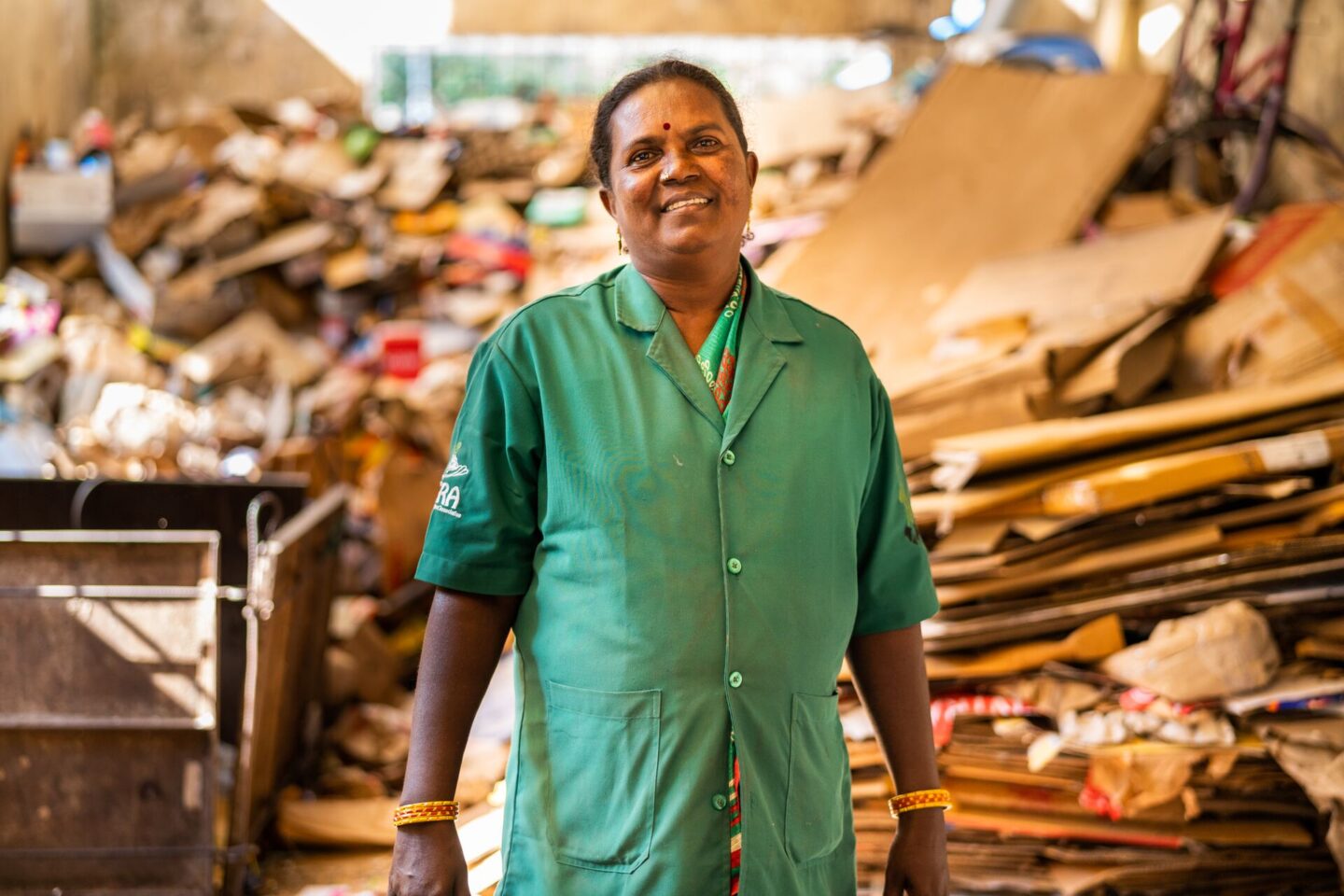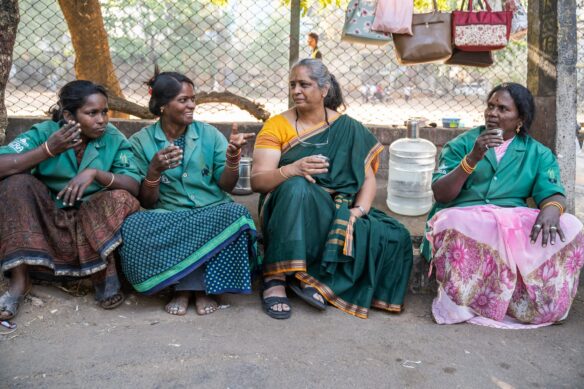In 2020, the H&M Foundation initiated Saamuhika Shakti, a collective impact initiative aiming to equip waste pickers to lift themselves out of poverty through a holistic ecosystem of organisations. Eight local partners are working together to support the waste picker community in various aspects – that the waste pickers themselves have identified – such as safe working conditions, access to social services and good quality education, water and sanitation, up-skilling or access to alternative jobs, innovations in waste management streams that are inclusive and provide livelihoods to the waste pickers, a shift in the way the population think about waste pickers, as well as increasing economic opportunities. The 4-year program (2020-2023) is funded by H&M Foundation with more than USD 11 million and aims to address the gaps in the system that keep waste pickers in poverty.
Two years in the making, Saamuhika Shakti is already impacting around 20,000 waste pickers including their families and has caught the attention of others. With the fashion and textile industry working to shift business models from linear to circular, sustainable materials are in demand, and recycled plastic plays a vital part in creating a regenerative industry. H&M Group has now become a business partner with the social enterprise Hasiru Dala Innovations, placing orders for millions of buttons partly made from recycled PET bottles (rPET) sourced by waste pickers in Bengaluru. This has extended the social impact of Saamuhika Shakti and will further benefit the waste picker community by creating jobs and income opportunities. It is a stand-alone business partnership which is not subsidised by the funds from the non-profit H&M Foundation.
“Waste management and material recycling are fundamental components of a circular economy, but in order for it to be truly sustainable, it needs to include the very group of people that upholds this value chain in India – the informal waste picker community. If challenges related to waste pickers’ lives and the waste sector can be addressed, waste pickers have the potential to be a key player in a global circular system – and could not only contribute to the health and state of our planet, but also uplift themselves out of poverty. We call it inclusive circularity.”
Maria Bystedt, Strategy Lead H&M Foundation.
The buttons are partly made from post-consumer PET waste collected primarily by informal waste pickers in Bengaluru, who segregate the waste and sell the PET to the social enterprise, Hasiru Dala Innovations, who have received “Guaranteed Member Status” from World Fair Trade Organization. The PET waste is then flaked and washed and provided to two of H&M Group’s button suppliers in India. The buttons are traceable down to the source of the waste along with names of the workers, social security, salaries and working conditions at the aggregation center.
Note to editors
- In India alone, 62 million tons of waste is generated annually and only 15% of the waste is processed and treated. The invisible force behind recycling is the estimated 1.5 – 4 million informal waste pickers who make their living by collecting, cleaning, sorting, and segregating this waste.
- While informal waste pickers play a vital role in waste management and the circular economy in India, they have been shunned and marginalised, largely made invisible for the rest of the community. Many completely lack access to social security benefits and endure a difficult everyday reality including regular harassment – not to mention the health hazards they are subjected to when handling the waste. Women and children of waste pickers are especially vulnerable to violence and discrimination, both within and outside their homes. Substance abuse is widespread and accessing affordable healthcare is a huge challenge.
- Saamuhika Shakti is a first-of-its-kind initiative where H&M Foundation aims to holistically address the gaps in the system that keep waste pickers in poverty and exclusion. It has so far reached around 20,000 waste pickers and their family members (March 2022). The initiative has a strong focus on equity, addressing the basic needs of marginalized groups such as women and girls. 8 partners are contributing with their expertise, working together in a powerful ecosystem where a collective impact setup ensures that all activities are mutually reinforcing and that all partners contribute to the overarching objectives and common agenda.
- As per Solid Waste Management Rules 2016, India, the term ‘waste picker’ is defined as ‘A person or groups of persons informally engaged in collection and recovery of reusable and recyclable solid waste from the source of waste generation in the streets, bins, material recovery facilities, processing and waste disposal facilities for sale to recyclers directly or through intermediaries to earn their livelihood. Waste pickers that are mentioned in this press release also includes waste workers employed at dry waste collection centers and informal waste entrepreneurs.
- Visual assets free to download, use and share can be found here.
- Saamuhika Shakti partners:
- H&M Foundation – Initiator and funder of Saamuhika Shakti
- The/Nudge Institute – Operates as a local backbone organization that coordinates the initiative
- BBC Media Action – Drives a perception change program, to improve professional pride among waste pickers and encourage Bengaluru’s general population to respect and value waste picking.
- Sambhav Foundation and CARE India – Offers up-skilling and supports alternative livelihood options – either within the waste management value chain or outside it. CARE India works to improve the knowledge of saving money, opening bank accounts, learning basic computer functions and expanding their digital literacy. Sambhav Foundation aims to improve the earning potential of waste pickers through skill development initiatives and employment support.
- Hasiru Dala – Improves linkages to government schemes, to enable access to basic services; and runs programs to reduce substance abuse and domestic violence in waste picker households. They are also developing user centric tools & equipment to improve working conditions.
- Save the Children India – Improves access to quality education, for example through mobile learning centers (buses) that visit the communities, to enable social mobility for children of waste pickers
- Social Alpha – Develops new waste streams by finding and supporting innovations that accelerate waste management in India, while increasing and improving the stability of waste picker incomes.
- Water Aid India – Offers affordable access to WASH facilities for waste picker households, with a focus on clean drinking water. WaterAid also trains the community to take on the ownership of the infrastructure developed in the communities.
Press contact
For more information or scheduling interviews please see our press site.



